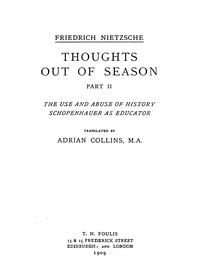Thoughts Out of Season, Part II by Friedrich Wilhelm Nietzsche
"Thoughts Out of Season, Part II" by Friedrich Wilhelm Nietzsche is an essay written in 1874. This work examines the proper role of historical knowledge in human life, challenging the prevailing notion of "knowledge as an end in itself." Nietzsche proposes an alternative approach where living becomes the primary concern, arguing that this perspective could improve society's health. The essay attacks both historicism and the possibility of objective understanding, while introducing Nietzsche's
increasingly elitist philosophy about humanity's true purpose and meaning. (This is an automatically generated summary.)
Read or download for free
| How to read | Url | Size | |||
|---|---|---|---|---|---|
| Read now! | https://www.gutenberg.org/ebooks/38226.html.images | 359 kB | |||
| EPUB3 (E-readers incl. Send-to-Kindle) | https://www.gutenberg.org/ebooks/38226.epub3.images | 189 kB | |||
| EPUB (older E-readers) | https://www.gutenberg.org/ebooks/38226.epub.images | 193 kB | |||
| EPUB (no images, older E-readers) | https://www.gutenberg.org/ebooks/38226.epub.noimages | 168 kB | |||
| Kindle | https://www.gutenberg.org/ebooks/38226.kf8.images | 286 kB | |||
| older Kindles | https://www.gutenberg.org/ebooks/38226.kindle.images | 259 kB | |||
| Plain Text UTF-8 | https://www.gutenberg.org/ebooks/38226.txt.utf-8 | 331 kB | |||
| Download HTML (zip) | https://www.gutenberg.org/cache/epub/38226/pg38226-h.zip | 175 kB | |||
| There may be more files related to this item. | |||||
Similar Books
About this eBook
| Author | Nietzsche, Friedrich Wilhelm, 1844-1900 |
|---|---|
| Translator | Collins, Adrian |
| Title | Thoughts Out of Season, Part II |
| Note | Wikipedia page about this book: en.wikipedia.org/wiki/Untimely_Meditations |
| Contents | The use and abuse of history -- Schopenhauer as educator. |
| Credits | Produced by Marc D'Hooghe, Charles Franks, Michael Roe and the Online Distributed Proofreading Team at www.pgdp.net |
| Reading Level | Reading ease score: 57.8 (10th to 12th grade). Somewhat difficult to read. |
| Language | English |
| LoC Class | B: Philosophy, Psychology, Religion |
| Subject | History -- Study and teaching |
| Subject | Schopenhauer, Arthur, 1788-1860 |
| Category | Text |
| EBook-No. | 38226 |
| Release Date | Dec 5, 2011 |
| Most Recently Updated | Apr 3, 2024 |
| Copyright Status | Public domain in the USA. |
| Downloads | 1512 downloads in the last 30 days. |
| Project Gutenberg eBooks are always free! | |

